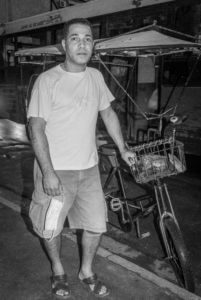 The next morning, Franky, the son of the owner of the Havana lodgings offered to take me in his taxi to the bus station. My departure was delayed some minutes when I looked at my left arm and saw a bloody gash from one of my backpack straps, but I applied antibiotic cream and a bandage I had packed. When I arrived downstairs, I realized that Franky’s vehicle was nothing more than a bicycle fitted in the rear with a small, two seat attachment. “Can you handle me and all this stuff,” I asked – for my “stuff” was about 80 lbs. He said it would be no problem, so off we went. I asked how far it was to the terminal and he said it was about three kilometers, so was feeling even more sympathetic to his exertions. Franky told me he was about 50 years old, but he “needed the exercise…and anyway one has to make a living!”
The next morning, Franky, the son of the owner of the Havana lodgings offered to take me in his taxi to the bus station. My departure was delayed some minutes when I looked at my left arm and saw a bloody gash from one of my backpack straps, but I applied antibiotic cream and a bandage I had packed. When I arrived downstairs, I realized that Franky’s vehicle was nothing more than a bicycle fitted in the rear with a small, two seat attachment. “Can you handle me and all this stuff,” I asked – for my “stuff” was about 80 lbs. He said it would be no problem, so off we went. I asked how far it was to the terminal and he said it was about three kilometers, so was feeling even more sympathetic to his exertions. Franky told me he was about 50 years old, but he “needed the exercise…and anyway one has to make a living!”
By the time we arrived and we said goodbye it was around 10 a.m. I located a ticket office and this when I learned something of the waiting burden Cubans face every day because it took me about three hours to stand in a line of just eight customers and finally have my ticket. By this time, I had settled on a destination that seemed of interest, the city of Holguín. The only seats available were on a bus departing around 7:00 p.m., so this would give me time to walk around the neighborhood and finally try to get a wi-fi signal at a local park. I thought I should check my heavier bag in advance, and this took yet another hour of waiting. I observed some inefficiencies to account for the plodding pace of processing. For example, while one employee entered information into a laptop computer, two others spent the entire time just looking over his shoulder, rather than weighing the bags of upcoming clients. (A Cuban taxi driver confided to me the next day that his compatriots have simply “given up trying,” since there is little incentive and the pay is so low.)
At the local park, I observed a commotion at one end and went to investigate (of course!) About fifty Cubans were in a swarming knot and one woman was shouting at others. I raised my mobile phone to record some action and was immediately warned by a portly woman that “The police will confiscate your camera if they see you filming”. It turned out that some in the angry group were dealing with individuals who tried to cut in line to buy cigarettes, a rare commodity for sale at the corner store. Someone informed me that many in line would be selling their purchases, so both the stakes and emotions were high. As I hurriedly left the scene, police arrived to quell the tumult, but not before pushing ensued and fights nearly broke out.
My bus was a fairly recent model and the seats were comfortable. I settled in for what would be an overnight trip with a number of stops in cities large and small. I was thankful I had packed a small airline type blanket, because the temperature inside the bus soon dropped to an uncomfortable level. I ate some of my vegan jerky and slept fitfully until just before dawn. Upon awakening and looking out of the window, I was pleased to see the remainder of my trip would be accompanied by a sleepy sliver of a new moon rising over the horizon. At a rest stop, I also happily noted that, owing to the lack of light pollution that increasingly plagues modern civilization, the stunning panoply of celestial bodies I had remembered from a journey across the Sahara Desert when I was in my 20s was intact and awaiting my admiration.
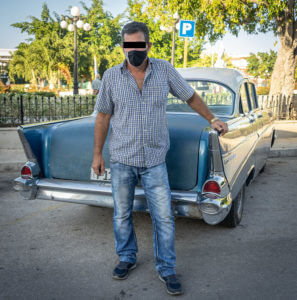 Deboarding early in the morning into the bus station in Holguín, I was entreated for patronage by many taxi drivers, but I demurred, preferring to examine bus schedules and plan ahead, in hope to avoid a long wait in line for a ticket to my next destination a few days hence. When I exited the terminal, I felt somehow drawn to one vehicle in 𝘱𝘢𝘳𝘵𝘪𝘤𝘶𝘭𝘢𝘳 somewhat in the distance. The driver seemed informed about “𝘤𝘢𝘴𝘢s 𝘱𝘢𝘳𝘵𝘪𝘤𝘶𝘭𝘢𝘳es,” I sought and we were soon off to the center of town. His name was Pablo Camonte (name change for his protection) and we soon struck up a friendly conversation. Because it was in bad shape, I inquired about his car and was informed it was a 1958 Chevrolet Hudson. When he lowered his face mask, I realized that he was the doppelgänger to a famous actor and he laughed in agreement, said that he had been told this many times in the past. “If we are stopped by the police, you must say that you and I are friends and I am not transporting you for money,” he instructed. You are an American and I can’t be seen giving you a ride. I memorized his name and some other facts of our “longtime acquaintance,” and we were now confidantes.
Deboarding early in the morning into the bus station in Holguín, I was entreated for patronage by many taxi drivers, but I demurred, preferring to examine bus schedules and plan ahead, in hope to avoid a long wait in line for a ticket to my next destination a few days hence. When I exited the terminal, I felt somehow drawn to one vehicle in 𝘱𝘢𝘳𝘵𝘪𝘤𝘶𝘭𝘢𝘳 somewhat in the distance. The driver seemed informed about “𝘤𝘢𝘴𝘢s 𝘱𝘢𝘳𝘵𝘪𝘤𝘶𝘭𝘢𝘳es,” I sought and we were soon off to the center of town. His name was Pablo Camonte (name change for his protection) and we soon struck up a friendly conversation. Because it was in bad shape, I inquired about his car and was informed it was a 1958 Chevrolet Hudson. When he lowered his face mask, I realized that he was the doppelgänger to a famous actor and he laughed in agreement, said that he had been told this many times in the past. “If we are stopped by the police, you must say that you and I are friends and I am not transporting you for money,” he instructed. You are an American and I can’t be seen giving you a ride. I memorized his name and some other facts of our “longtime acquaintance,” and we were now confidantes.
Pablo recommended I look at the 𝘤𝘢𝘴𝘢 𝘱𝘢𝘳𝘵𝘪𝘤𝘶𝘭𝘢𝘳 of a good friend of his, and upon entering, I appreciated the tip. I had a good-sized apartment with private bathroom all to myself, with amenities I didn’t expect, such as air conditioning, television, kitchenette, hot water, and a refrigerator amply stocked with bottled water. Cost including breakfast was to be 1,500 Cuban pesos (CUP), which – depending on whether one used the black market or official exchange rate – was from to $25 to $60 a night (I was able to use the former rate, since the owner of my Havana 𝘤𝘢𝘴𝘢 had generously exchanged some Euro currency I had.)
Hungry and stiff from the uncomfortable bus trip, I ate some of my food and accepted a cafecito of strong coffee and some bread as breakfast from the owner of the 𝘤𝘢𝘴𝘢, Amanda (name changed for her protection). I had queried Pablo whether there were any rivers nearby because I imagined there would be people using it for washing, bathing, or swimming, but he said the seasonal rains had passed many months ago, but he knew of a local lake where some petty gold mining was going on. So, after I extracted my photo gear and left my clothes at the 𝘤𝘢𝘴𝘢, off we went again in his creaky ‘58 Hudson. During the bumpy trip to the lake, he explained all of the repairs and improvements he had made to the car; most exciting to him was a pair of tail fins he had acquired, and at one point I posed him by the shiny chrome protruding projectiles. The blasting claxon sound made by his horn was the first five notes of “La Cucaracha,” which he happily played on various whims or when driving by someone he knew.
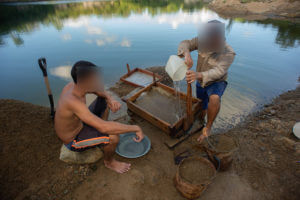 The lake was smaller than I anticipated and we hiked a bit to watch two men sifting wet soil on an improvised sluice. They seemed uncomfortable when I raised my camera, but I assured them I would not report them nor reveal their names. “We would be taken to jail if caught mining gold,” one said. I was surprised it was not just a fine they would receive. Using fill-flash, I made a photo that showed them at work. I made another later digitally developed into black-and-white and inserted into my Global Vistas series; one man bent over in labor and the other looking off into the distance in an expression of resignation (actually this was the first photo I made of them and I hadn’t yet reassured him of my trustworthy intentions, so he was nervously averting his gaze.) Scattered nearby were deep, man-sized and meters deep holes dug into the soil. Returning after some time to Pablo’s car, I paused to caress and chat with a couple of tethered horses belonging to the miners, then entered a now-scorching car.
The lake was smaller than I anticipated and we hiked a bit to watch two men sifting wet soil on an improvised sluice. They seemed uncomfortable when I raised my camera, but I assured them I would not report them nor reveal their names. “We would be taken to jail if caught mining gold,” one said. I was surprised it was not just a fine they would receive. Using fill-flash, I made a photo that showed them at work. I made another later digitally developed into black-and-white and inserted into my Global Vistas series; one man bent over in labor and the other looking off into the distance in an expression of resignation (actually this was the first photo I made of them and I hadn’t yet reassured him of my trustworthy intentions, so he was nervously averting his gaze.) Scattered nearby were deep, man-sized and meters deep holes dug into the soil. Returning after some time to Pablo’s car, I paused to caress and chat with a couple of tethered horses belonging to the miners, then entered a now-scorching car.
After Pablo returned me to my lodging and I enjoyed a brief siesta, I forced myself to go out into the town and make photos in the lowering sunlight and into the evening. I watched a group of men playing chess in the town square, entered the cemetery, and checked out a few restaurant menus. I must have walked some two miles. Just as I was beginning to head back for the night, I saw some smoke rising from a distant 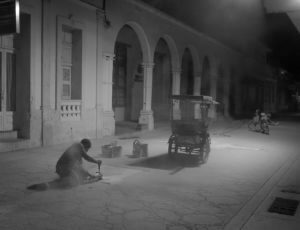 street. Investigating, I found two men using circular drills to smooth ornamental features in the ground, and I made a photo with my widest-angle lens that I later concluded was meaningful and well-composed. I had forgotten to count the streets but somehow intuited my way back the ten blocks to my apartment, but not before I squeezed off a couple more photos. One was of a woman sitting in a small portal of a door under a vast and antique façade in the golden and artificial street lights. When I saw her, I literally gasped, because the scene was so exciting to me, a great addition to my Walls/Spaces photo series.
street. Investigating, I found two men using circular drills to smooth ornamental features in the ground, and I made a photo with my widest-angle lens that I later concluded was meaningful and well-composed. I had forgotten to count the streets but somehow intuited my way back the ten blocks to my apartment, but not before I squeezed off a couple more photos. One was of a woman sitting in a small portal of a door under a vast and antique façade in the golden and artificial street lights. When I saw her, I literally gasped, because the scene was so exciting to me, a great addition to my Walls/Spaces photo series.
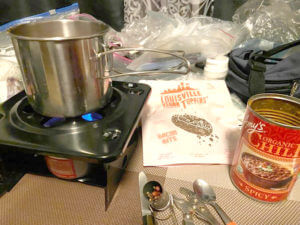 My dinner that night was one of my cans of beans – Amy’s Spicy Chile – cooked over my folding stove and heated by a Sterno can I packed; dessert was a sliver of fudge I had brought with me from Florida, and I recalled the county fair B, little D, and I had enjoyed a few weeks prior, where I had bought the candy.
My dinner that night was one of my cans of beans – Amy’s Spicy Chile – cooked over my folding stove and heated by a Sterno can I packed; dessert was a sliver of fudge I had brought with me from Florida, and I recalled the county fair B, little D, and I had enjoyed a few weeks prior, where I had bought the candy.
I rose early the next morning, hoping to make some photos in the local streets using the emerging sun before returning at 8:00 a.m., the appointed time for Amanda to bring me my breakfast. When I peeked out of the window, the sky was cloudy from an earlier rain, but the sun soon broke through and, as I exited my apartment, I was greeted by a stunning rainbow. But any luck it brought with it was lost through my inept fumbling after I had walked a block and while searching for my ear plugs – greatly required in these streets of noisy motorcycles and heavy trucks. I had apparently left the hearing protectors with my bags but knew I had a back-up pair somewhere in my camera bag. Searching for it was getting increasingly frustrating as I juggled all my two cameras, a cloth bag to hide them, and the heavy camera bag, and I simultaneously tried to keep prying eyes of the passing public off of my visibly expensive gear. The morning sunlight was losing its magic.
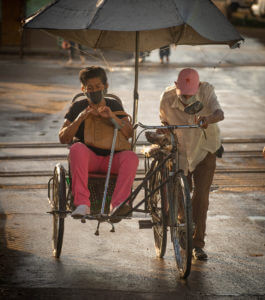 Earplugs finally found and inserted after a wasted ten minutes, I was able to resume my walk, which took me by a train station and busy, wet streets filled with all manner of transport including bike-taxis and horse-drawn carts. At one point while walking along the train tracks, I found a rock that would be added to my collection from around the world and secreted it in my bag. I then noticed an elderly man some thirty yards away looking at me from his porch with concern and remembered how revolutionary Cuba always had civilian street patrols to spy and report, so I hurried away from him. More rains briefly pelted the area and I found refuge under the branches of a large tree, from which I could use my telephoto lens to take photos of locals in the glancing sunlight. Another rainbow arrived, but I failed to get a good photo of this appearance because one of my cameras seemed to malfunction in the humidity, another frustration of the morning!
Earplugs finally found and inserted after a wasted ten minutes, I was able to resume my walk, which took me by a train station and busy, wet streets filled with all manner of transport including bike-taxis and horse-drawn carts. At one point while walking along the train tracks, I found a rock that would be added to my collection from around the world and secreted it in my bag. I then noticed an elderly man some thirty yards away looking at me from his porch with concern and remembered how revolutionary Cuba always had civilian street patrols to spy and report, so I hurried away from him. More rains briefly pelted the area and I found refuge under the branches of a large tree, from which I could use my telephoto lens to take photos of locals in the glancing sunlight. Another rainbow arrived, but I failed to get a good photo of this appearance because one of my cameras seemed to malfunction in the humidity, another frustration of the morning!
After a breakfast of Amanda’s bread and cereal I had brought, I totally emptied my camera bag onto my bed and repacked with better care so I could locate each item more quickly, then plugged in all my battery chargers and topped off my phone and aging MacBook Pro laptop. Pablo arrived sooner than I had expected and this time he brought his 14-year-old son Robert, whom he had picked up from school. I presented the young man (he insisted I call him what sounded to me like “Robber”) with an English language teen comic book I had brought in my bag for just such an opportunity and I also shared some U.S.-made chewing gum. Pablo was happy to take me on a few errands and we went to the local bus terminal first to buy my ticket to the next city, Santiago.
To my surprise and disappointment, it turns out that Cuba has two separate and very different bus systems, one for nationals and the other for foreigners. At the terminal, I was directed to the ViaAzul office to buy my ticket. As when I was in Havana, I was instructed I could use only a credit card to pay.
“What about the Cubans who have no cards, how do they pay?” I asked the young lady behind the ticket window.
“Ah, they are not allowed on ViaAzul buses, and must ride on the national buses,” she retorted.
“But this seems very unjust! What happened to the Revolutionary ideals?” I complained.
She smiled tellingly, “Welcome to Cuba!”
Pablo and his son were waiting for me in the car and when I explained that I was reluctant to use my credit card because I had heard that U.S. banks would block further use if a charge from Cuba were submitted, he said he knew just what I should do, that I could simply go to the bus driver of the national line and pay a “little something under the table” to be allowed onto the bus. I warned him that I didn’t want to do anything that would get me in trouble and he said, “Nahhh, don’t worry, it’s totally okay here!”
We then made a plan that Pablo would take me the next day to a nearby beach, Playa Blanco, so I could use a mask and snorkel I had brought with me, then the following day when I returned, he would take me to a nearby hotel where I could catch a locals-only bus. He said he would facilitate the transaction to Santiago by talking with the bus driver. My anxieties increased later that day when I learned from a couple of Canadians I happened across at the town square that the beach he planned to take me to was off-limits to all but Cuban nationals.
That evening, my second and final meal of the day was a trail-mix I had packed (pecans, walnuts, raisins, coconut flakes). In addition to about ten ounces of vegan jerky, have just one more small can of baked beans and I want to save it for my day at the beach. Surprisingly, although I am consuming just a quarter of my normal calories, and I have already reduced by belt by one notch, I have not yet had any headaches nor felt missing energy. My body seems to be coping very well, but I am careful to do yoga exercises a couple of times a day and also lift my heavier bags very cautiously. I know that one torn muscle could abort my entire trip!
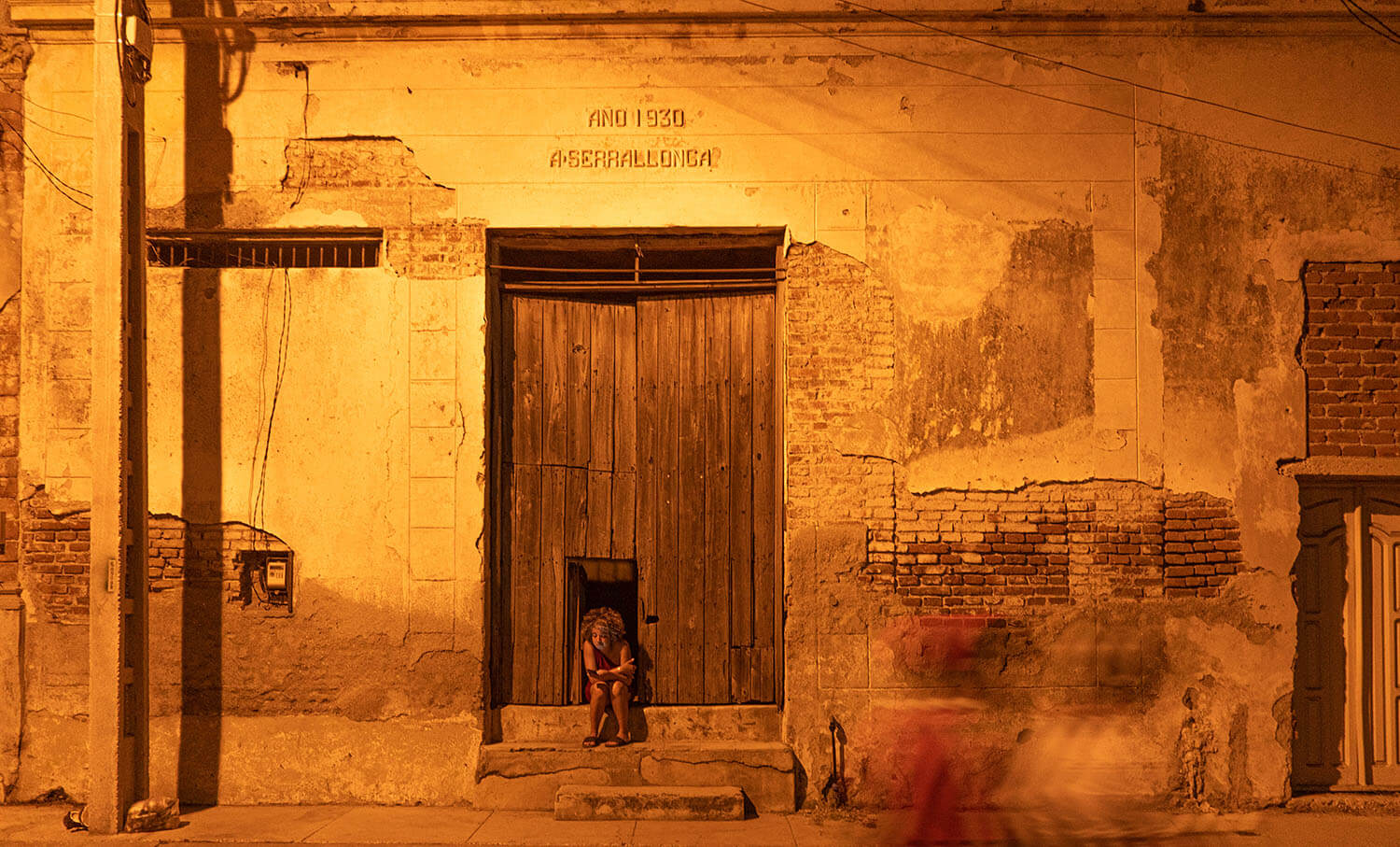
I admire the beneficial information and facts you provide in your posts.